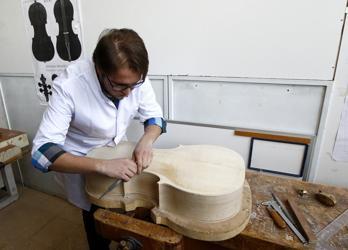Istanbul Technical University working to protect music
ISTANBUL - Anatolia News Agency

At the Istanbul Technical University’s Turkish Music State Conservatory, the styles run the gamut from Turkish folk music to Turkish classical music, and also include classical Western music and other inter-disciplinary genres. AA photos
Not just a conservatory, Istanbul Technical University’s (İTÜ) Turkish Music State Conservatory is continuing its four decades of work as a repository for different genres of music spanning the spectrum from Turkish folk music to Western music.
The school is a unique institution that possesses a global presence thanks to its activities, Professor Adnan Koç, the conservatory’s manager, said at a recent event at İTÜ’s Maçka Campus that included a Turkish classical music concert by students from the conservatory.
Hailing the conservatory as a trailblazing institution for music in Turkey, Koç said the facility was established to document, research and spread contemporary Turkish music and other kinds of Turkish music throughout the world. “Our school includes a total of 28 different music instruments, and lots of Turkish music styles.”
The styles run the gamut from Turkish folk music to Turkish classical music, and also include classical Western music and other inter-disciplinary genres.
With its 180 teachers and 800 students, the school is a pioneer in Turkey and is open to those who would like to study music as a main major.
 Famous alumni
Famous alumniMany of its alumni have since become famous in the international art scene, said Koç. “The conservatory was established in 1976. Earlier, it was not possible to establish a conservatory like this because Turkish music had experienced some hard days in the past. After a period of time, the school was founded just to show how important it is to protect and preserve Turkish classical music.”
Noting that today there are approximately 50 conservatories in Turkey, five of which focused on Turkish music, Koç said the country’s classical music had occasionally been treated unfairly.
“Sometimes, Turkish music has been treated like a stepchild in its own mother country. We cannot see any other examples of this in other countries,” he said, adding that the perspective of seeing Turkish classic music as “unnecessary” should change.
“We need support to hear our music in the world. There are many important works done here in the conservatory, and we need to make them global. That’s why we need support,” he said.
The same conditions and opportunities that Western music conservatories see in Turkey should also be given to Turkish classical music, he said.
Noting that there were many famous singers who had graduated from the İTÜ Turkish Music State Conservatory, Koç said most of them were abandoning the main rules of music in the interests of becoming famous.
“Economic concerns force people to make other kinds of music. The graduates who make these kinds of music are deforming music and deforming the frequency of the music,” he said.

 Famous alumni
Famous alumni